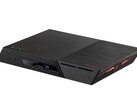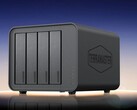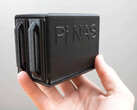While multitasking is a staple of a modern operating system, you have far greater control over your PC’s resources with some virtualisation software and better stability and reliability to boot. Running 24/7 for months at a time is par for the course with this type of software, and when you can run multiple operating systems, network shares, dockers, home automation, VPN’s, disk arrays and backups on a single machine, stability is key.
TrueNas Core / Scale
Truenas Scale is the redeveloped version of FreeNAS from iXsystems. It will allow you to run virtual machines, host SMB, NFS and iSCSI network shares as well as implement your own docker containers. TrueNAS Scale also allows the hosting of Virtual Machines with GPU passthrough and has one of the easiest methods of backing up your network shares to cloud providers of any of the solutions here. It utilizes ZFS which is both reliable and fast, as multiple disks in an array can be written to simultaneously.
You could also consider TrueNAS Core, but as of version 13, this will be the last version built with FreeBSD as the base and may not be supported for much longer. GPU passthrough is not straightforward with Core and it does not support Docker, instead opting to implement a similar solution called “Jails”, although most of the key apps you could want are present and accounted for.
Positives
Better if not the best performance on network shares
- Interface is gorgeous
- ZFS is a more robust file system
- Free
Negatives
- VM performance is subpar
- No docker on Core
Unraid
Unraid excels at being the “do it all” virtualization platform. From a NAS perspective it has all the shares you’d expect, docker support with a massive library of apps that make them trivial to deploy, and the ability to run virtual machines with GPU passthrough.
While all the features of a NAS are there, it has the added benefit of being able to mix and match disks of different sizes. As long as your parity drive (the drive that will enable you to restore a failed drive) is the largest in the array. Where Unraid differs is that parity is not spread across disks as it is in a RAID array and speed maxes out at the write speed of a single disk. If you are looking for the fastest network shares possible, Unraid isn’t it. However, virtual machine support is excellent and you can get near native performance when passing through SSD’s, GPU’s and other peripherals to a VM.
The other area where Unraid falls behind is with backups to cloud services. There is no native backup solution built in as there is with TrueNAS. Instead you are reliant on backing up with the help of dockers and rsync. While backups do work, they aren’t as easy to implement as TrueNAS
Positives
- Excellent virtual machine performance, particularly for gaming
- Ability to mix and match disk sizes
- Docker support
Negatives
- Not free
- Weak network share performance
- Cloud backup is tricky
Proxmox
If Unraid and TrueNAS are NAS focused, Proxmox excels at Virtualisation. You have complete control over your VM’s and can back them up to a disk array without even powering them down. You can even move them between Proxmox clusters without the person using the VM noticing. Performance is on par with bare metal and naturally you have excellent support for passing through pretty much any PCI-E device to any VM you like.
As Proxmox is so focused on virtualisation, there isn’t native support for Docker. Instead you would host a virtual machine and run Docker from within that, although you can deploy containers from within Proxmox. Just like the other platforms mentioned here, you do get a nice web based GUI for managing all this.
Positives
- Best VM performance
- Free
Negatives
- Not intended to be used as a NAS out of the box
- Motherboards with good IOMMU groups needed
If you are planning on building a home server (or even if you're not) it's worth considering the 12 core / 24 thread AMD Ryzen 5900X which currently an absolute steal at over 50% off on Amazon* right now.














